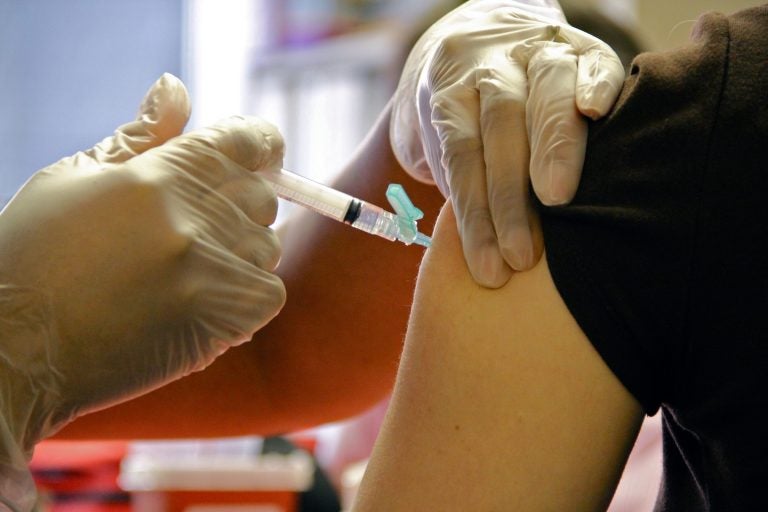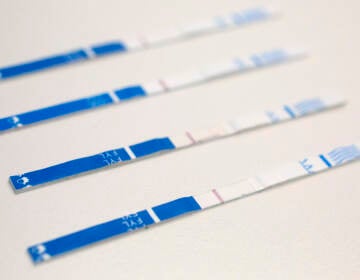Controversial measure in N.J. would end all religious vaccine exemptions for students
Children would need a doctor’s note to attend class without getting shots. The proposal could go before full Senate vote Monday.

(Emma Lee for WHYY)
This article originally appeared on NJ Spotlight.
—
Amid a growing battle over vaccine choice, New Jersey lawmakers seem poised to advance a measure Thursday that would only allow schoolchildren to be exempted from immunization requirements for medical reasons, eliminating the “religious exemption” now on the books.
A controversial Senate bill to significantly restrict these religious exemptions was apparently amended late Wednesday to align with an Assembly version that strikes this option entirely, according to a draft shared with NJ Spotlight, meaning kids would need a doctor’s note to attend class without first getting these shots. Roughly 30,000 children requested some form of exemption this year, according to the state.
The proposal is scheduled for a vote Thursday in the Senate health committee, where it is expected to be approved — although some usual members may be replaced for the hearing by other lawmakers to ensure the legislation has sufficient support; the bill is also listed on the agenda for a full Senate vote on Monday. Advocates for and against the measure plan to show up in force Thursday for what is likely to be a raucous and emotional hearing.
First introduced nearly a decade ago, the concept, championed by the two health committee chairs — Sen. Joe Vitale (D-Middlesex) and Assemblyman Herb Conaway Jr. (D-Burlington), a doctor — has pitted public health advocates, who want to ensure as many children as possible are vaccinated, against some parents and allies who are concerned about potential side effects from these shots or the way they are mandated by state government. The issue has taken on renewed urgency recently with the uptick in measles outbreaks; nearly 1,300 people have been infected nationwide this year, including 19 in New Jersey.
New Jersey law requires youngsters to be immunized against more than a dozen diseases — including chickenpox, measles, polio, tetanus and whooping cough, some, but not all of which are highly contagious — to attend child care programs and public or private schools in the Garden State, unless they obtain an exemption.
“This is our climate change,” said Michael Weinstein, director of the pro-vaccine New Jersey Immunization Coalition, underscoring the overwhelming scientific evidence of how vaccines protect public health. Weinstein has rallied public health officials, school nurses, pediatricians and others to attend Thursday’s session in support of the bill.
“It’s your choice to vaccinate your children or not,” Weinstein said, “but it’s the state’s responsibility to protect public health” by requiring schoolchildren be immunized.
‘Slap in the face’ to democracy
Opponents of the bill took issue with the Legislature’s process — calling it undemocratic to swap out committee members — and the content of the bill, which they said forces parents to chose between their beliefs and their child’s education. Sue Collins, co-founder of the New Jersey Coalition for Vaccine Choice, called the process a “slap in the face” to the opposition and democracy in general.
“That’s not right,” Sarah Lane, a pediatric optometrist aligned with the coalition, said of the legislative push to limit vaccine exemptions just to medical reasons alone, without permitting parents to also opt out for religious reasons or because of other personal convictions. “That’s not living in a free country.”
While Lane does not oppose all immunizations, she believes families should have the choice to decide which shots their kids should receive as they grow up. “A one-size-fits-all medical approach to vaccines is not appropriate,” she said.
Public health experts are concerned that parents’ fears are being inflamed by misinformation about the safety of immunizations, which are widely credited with helping to effectively eliminate several communicable diseases (including measles, until the recent uptick). Some 94.2% of the state’s pupils were vaccinated this year, down from 95.3% five years ago, state data shows. During that same period, the use of the state’s existing religious exemption option has grown from 1.7% to 2.6%, while medical opt-outs have remained largely stable, around 0.2%.
In June, the state Department of Health also updated guidance for medical providers — based on parameters developed by the American Academy of Pediatrics and federal agencies — to clarify the requirements around religious exemptions for vaccines. A rise in provider questions about the process sparked the update, which notes that clinicians who do not follow this protocol could be subject to a licensing review.
Conaway’s health committee advanced the original Assembly version of the bill in April 2018 — which tightened, but did not eliminate, religious exemptions — following a volatile meeting that ended with opponents of the measure hurling insults at the lawmakers and calling their actions shameful. Only two public health officials testified in favor of the legislation at that time. In January, the measure was amended by a voice vote of the full Assembly to strike the religious option entirely; the revision has yet to be posted for a full vote in that house.
Weinstein, with the immunization coalition, has been rallying public health advocates to show up in force Thursday for what will be the first Senate hearing on the bill in the current two-year legislative session, which ends mid-January. These officials favor the latest Conaway version of the bill (A-3818), he said, which reframes the issue on medical grounds alone without engaging the question of religious beliefs.
(As of Wednesday night, the publicly posted version of Vitale’s bill (S-2173), co-sponsored by Sen. Loretta Weinberg (D-Bergen), had yet to be updated to reflect the changes provided to NJ Spotlight.)
But Lane, who opposes the mandate, said the measure essentially “coerces parents into accepting vaccines” in return for access to education for their children. “What are your choices here” if you don’t want to immunize your kids and don’t have the luxury of home education, she said, noting this would be a real question for tens of thousands of families if the bill were adopted and signed into law as now drafted.
WHYY is your source for fact-based, in-depth journalism and information. As a nonprofit organization, we rely on financial support from readers like you. Please give today.




